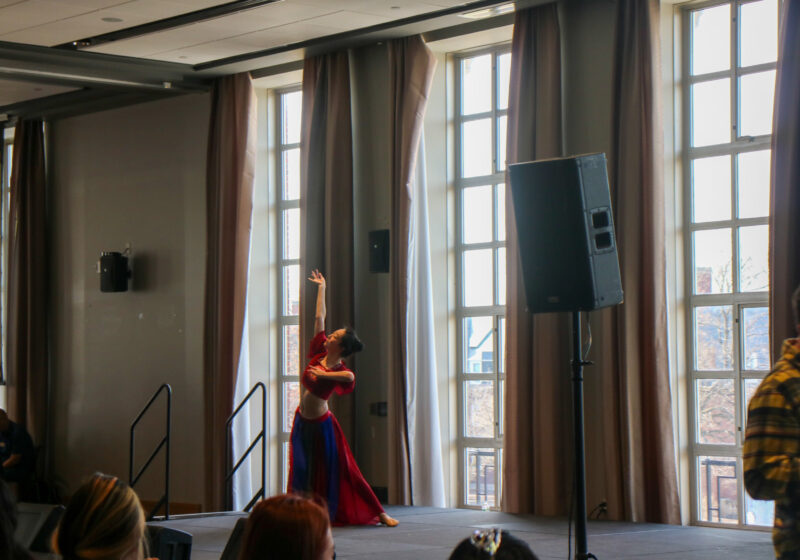Greek life: to commit or not to commit. That was the question.
As a freshman, after a great deal of convincing from friends and sorority women at information sessions, I registered for Panhellenic recruitment two nights before the deadline with minimal expectations. The names of sororities were foreign to me; I never gave them much thought one way or another.
A very small percentage of incoming Rochester students expect to join Greek life, and most, like me, are initially pretty indifferent. Nevertheless, roughly a quarter of our campus ends up affiliated.
Greeted with tireless enthusiasm in the form of cheering and positive conversations, I immediately was hooked. I loved talking to the women in each chapter. I sailed through the first few days with a bright smile on my face, eager for more.
As a close friend of cynicism, I was caught off guard about how much I was enjoying the process. The women tell you to try to find the place that feels like a second home, and somehow the dizzying process of recruitment really causes that feeling to happen. I was intrigued, seduced perhaps, with the idea of joining a supportive group of women who would push me to be my best self. I was called back to attend all of the available parties each day, a feat that made me feel oddly proud and accomplished.
With audible joy in my voice, I called my parents and attempted to diminish their skepticism.
Sorority recruitment takes place over four days. Potential new members (PNMs) visit each sorority the first day during short “parties,” speaking to three to five women from each chapter. If you miss any sessions, you are essentially disqualified. You cannot discuss bids, partying, alcohol, or men. At the end of each night, you rank your preferences, as does each sorority, and you’re matched up through a mutual selection system. PNMs are each assigned a Rho Gamma, a temporarily disaffiliated woman who serves as your recruitment guide. The next day, you are told which sororities called you back, as you can only go back to a decreasing number each day.
As I was indulging in the glow of feeling wanted, I began to see friends face rejection. It bothered me, but I was mostly consumed by my own experience. Women were cut from chapters they had listed as their top choices. A sorority member would likely avoid the word “cut,” but instead explain recruitment as a numbers game; you go back to sororities that rank you higher on their lists than others. Each day and night you see women fighting back tears caused by this rejection.
It’s easy to dismiss that fact as silly. I mean, who cries over a sorority, right?
Well, it turns out…me.
After the final day, “pref night,” I did not receive a bid from the chapter I listed as my first choice. The sleep deprivation, long hours of being evaluated, and brutality of rejection hit me all at once, yielding relatively public and very embarrassing tears. I questioned why I wasn’t good enough for that chapter, why they didn’t want me. The pride I had felt after getting called back to all of the parties shattered.
Why had I been called back to so many chapters? Why had I even felt proud of that in the first place?
I knew logistically, of course, that women had to be cut; sororities can only take so many members. Yet, the feeling accompanying that type of rejection was familiar—the piercing sting of exclusion, submersion into self-doubt. It was a feeling similar to that of being left on the outside of a middle school clique you secretly yet desperately wanted to belong to.
Hurt and staggering as I was, all was not lost. I accepted a bid from another chapter, one that I loved during recruitment nearly as much as the other. I stayed optimistic and fully expected to become a sorority woman. I reassured myself with the soft logic of the “everything happens for a reason” mythology. I pictured myself cultivating lifelong friendships, anticipating “Big-Little Week” and proudly wearing letters around campus.
And yet I knew something didn’t feel quite right.
I imagined having to select women during recruitment myself, causing the same inevitable rejection I had so resented. I wrestled with the possibility of dropping out, but I thought about all of the experiences I would miss and changed my mind several times.
Ultimately, being fully honest with myself, I knew Greek life wasn’t for me. I dropped out of pledging after two weeks.
Recruitment is a highly immersive experience that occupies every thought and conversation you have during those long days. In a heightened emotional state, approval from each sorority seems imperative, rejection devastating.
What troubled me more than anything was being told repeatedly that getting cut wasn’t personal, despite the process feeling entirely personal.
You are rated on your conversations. These conversations are largely superficial: your major, hometown, why you wanted to join a sorority. Judgments about you are made based on a mere snapshot. If you make it to the final night, you have maybe spoken with 15 to 20 women in total out of a sorority of 60 plus. This fraction of members rates you off of whatever information they could each gather in ten minutes.
In hindsight, one can’t help but wonder how they could consider much beyond a quick assessment of things like your personality, appearance, and clothing. You are told to be yourself, but in the end, you are reduced to a score.
In the immediate months after deciding not to continue, I watched enviously as what seemed like a huge majority of campus was having all the fun without me. I questioned whether I had made the wrong choice. I feared becoming socially ostracized, having nothing to do on campus.
Fortunately, this freshman anxiety was not foreshadowing. A senior in the sorority I was cut from helped by reaching out and urging me not to be discouraged. She invited me to meet in person, and she emphasized that Greek life was a significant part of her college career, but far from defining.
That senior’s incredible gesture provided a bridge to a sense of calm, and with increasing distance I realized my choice whether to join Greek life would not define me as a person, and did not have to determine my college experience.
I created and embraced new opportunities for myself. I ran for student government, sampled lots of organizations, took on leadership positions, strengthened existing friendships, pushed myself to meet new people on my own, studied abroad, and expanded my academic interests. I’ve had a truly fulfilling college life.
Now, hopefully like that gracious senior once did for me, I offer you my story from my own perspective as a senior. Whether you decide to join Greek life, I encourage you to make the most of these years that go by so fast, and to be an active force in crafting a journey at Rochester that is unique and true to who you are.





